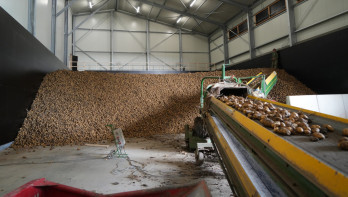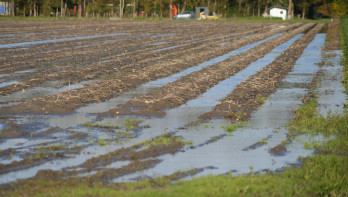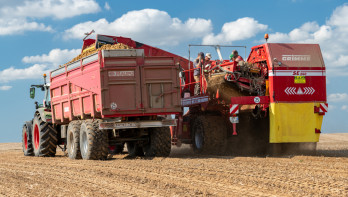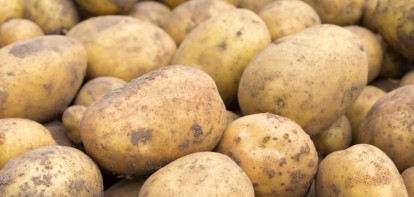Feature Potatoes
'Sometimes still more than 100 hectares to be planted'
Superlatives fall short to describe this spring properly. Even in the second half of June, potato planters are still in full swing in parts of the Netherlands and Belgium. There are growers where 100 hectares or more still need to be planted. Boundaries are being pushed and expanded. The message from the processors is clear: every potato is urgently needed.
The three southern provinces: Zeeland, North Brabant, and Limburg are areas where the planting of potatoes is still not completed. Elsewhere in the country, it is locally about a single field, or parts thereof, but especially in Brabant and Limburg, the larger potato growers still have a considerable area to plant. Sometimes it concerns 100 hectares per company or a multiple of that, insiders inform Boerenbusiness. Here too, previously planted fields sometimes need to be replanted (in part) because large parts have been lost due to water damage.
New showers on the way
A small relief is that last week relatively little precipitation fell, especially in the above-mentioned provinces, allowing good progress to be made with planting. This is particularly the case in the southeast of the country. Farmers are preparing again because on Tuesday (June 18), heavy thunderstorms are expected that can locally cause 30 to 50 millimeters of precipitation. The soil is still quite saturated from the rain in May, making every millimeter one too many.
In the southeast and southwest, relatively good potato fields can also be found that were planted early, but you have to search for them. The differences are therefore enormous. "Not all potatoes have been planted in Zeeland," says advisor Bram de Visser of CZAV. "That is the case in Zeeuws-Vlaanderen, on Walcheren, and Schouwen-Duiveland. Also in West Brabant, potatoes still need to be planted, especially in the planting area around Kruisland."
This is also mentioned by Delphy advisor Reinier Stoutjesdijk, who is a farmer himself. "Recently, a lot of rain has fallen in West Brabant in a short time, causing damage to potato crops. In all of Southwest Netherlands, you will find fields with water damage. It is almost standard that at least 10% to 20% of the plants are missing."
Planting continues
Until what time can you still plant potatoes? It is a question that no one dares to answer definitively. With the longest day rapidly approaching (next Thursday, June 20), you would expect this to be approximately the end date, but growers indicate that they want to plant all potatoes. After all, the land has been rented, the seed potatoes delivered, and fertilization carried out. "The buyer (french fry factory) indicates that they want all potatoes, so we just continue planting," says a grower. In Brabant, 'autumn seed potatoes' were grown until forty years ago, which were planted after August 1 and harvested at the end of November. The current scenes are starting to resemble that.
Potato growers have mixed feelings on the planting machine. French fry factories urgently need every potato and therefore push for planting. At the same time, it is the grower who takes a risk. Currently, in the free market - with potato prices up to €70 per 100 kilograms - a significant premium is paid, but those who have signed a contract cannot benefit from it. As described, even the already planted fields are not really top-notch. Growers fear another poor harvest that they can hardly digest. Even if the weather becomes conducive for growth, the June potatoes will only yield half a crop that barely fills the contracted volume.
'From just above to 55 and up'
In addition to waterlogging, the extremely high pressure of late blight is putting things on edge. In Flevoland, the first organic potato fields have already been burned, while there is no yield. In addition to these hotspots and volunteer plants, sometimes there is a latent infection present in the seed potatoes, knows Delphy advisor Niek Vedelaar, who works in Flevoland. "Seed potato growers who have already selected are encountering plants with stem late blight. "With moderate temperatures, it is really potato weather. The earliest crops have the first 55 millimeter tubers underneath. The wet weather ensures that soil herbicides do their job well. Sometimes too well, causing crops to turn yellow. This slows down growth."
Especially in the clay areas, in the southwest and Flevoland, growers have had difficulty hilling up the potato ridges. This has consequences. "Where hilling was done while the potatoes were already above ground - in combination with herbicide and disease control - we see that plants do not emerge or emerge with difficulty," notes Vedelaar. His colleague Stoutjesdijk also sees this pattern manifesting itself in the southwest.
Northeast slightly better
In the east and northeast of the Netherlands, growers have slightly fared better, although this also varies per region and sometimes per village. A few kilometers can make a difference whether a shower has hit you or not. "You come across fields that are close and just emerging," notes Delphy advisor Bert Huizinga. The late blight pressure is high, but it does not cause major problems. However, you notice that sensitive varieties are more affected. During the first infection moment, the later planted crops just emerged, thus avoiding the worst. Fortunately, arable farmers were on top of it during the second round."
Heading towards the transitional soils in Groningen and then along the Wadden coast, waterlogging is indeed frequent again. In the Hoogeland, locally 30 millimeters of rain fell on Sunday and fields were still flooded. Heavy showers around Ascension Day have already caused considerable damage there. Watersheds can also be found around Veendam. Almost all potatoes have been planted in the northern provinces, but the finish line is not yet in sight.




